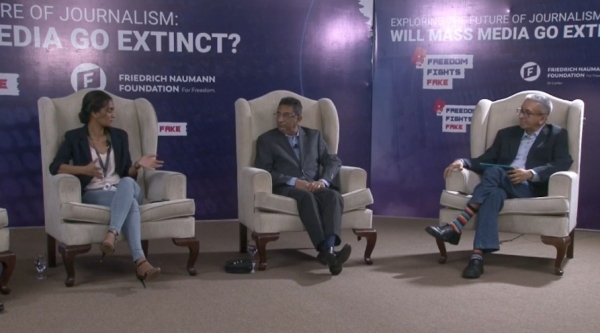Sri Lanka’s mainstream media has already lost trust in the eyes of the public but somehow they continue to survive, inexplicably, prominent digital journalists said at a panel discussion on the future of journalism held yesterday.
“I don’t know how they continue to operate despite diminishing public trust. People know that they are being fed biased news, but they continue to consume such news because they have learnt to filter out what was the truth and what was not,” Roel Raymond, Chief Editor of Roar Media said during the discussion. Media Analyst Nalaka Gunawardene who moderated the discussion also pointed out how several loss-making media houses were inexplicably still in business despite no fresh infusions of money.
“Whether this is good for the industry or not is for us to decide and make a change,” Raymond said — pointing to how despite the loss of public trust, legacy media continued to do well and would not die.
Imran Furkhan, a international commentator pointed out that in the Sri Lankan context, there was a very simple answer to this: “The electronic media groups are an offshoot of another business group and the whole purpose of its survival is merely to project a political viewpoint, for which in return you get favours when they are in power…from advertising, to exclusive interviews..that kind of access can be very lucrative," he said. "And this will continue because there is a lot of money in it.
The answer by Raymond was in response to a comment by the audience, on whether legacy media would survive now that public trust was lost because people knew they were owned by politicians and that the news was manipulated based on political agendas.
The panel was unanimous that it would survive despite loss of public trust, but that it was not good for the industry or for the consumers - especially the younger generations who were not aware that they were being fed propaganda.
Arjuna Ranawana, Chief Editor of Economynext also commented that investigative journalism no longer existed in Sri Lanka the way they were used to, and the panel agreed that journalism was in a crisis albeit unnoticed by many.
Ranawana spoke highly of public service media, and Furkhan, a international affairs commentator on the panel said it was time society, and cilvil society activists pushed for public service media to begin in Sri Lanka.
He also said he though mass media would continue to exist but in niche markets and that it was not a bad thing since it contributed to diversity of voices and plurality of media. The discussion was on the topic ‘Will Mass Media Go Extinct’ and was organized by the Friedrich Naumann Foundation for Freedom in Sri Lanka.










